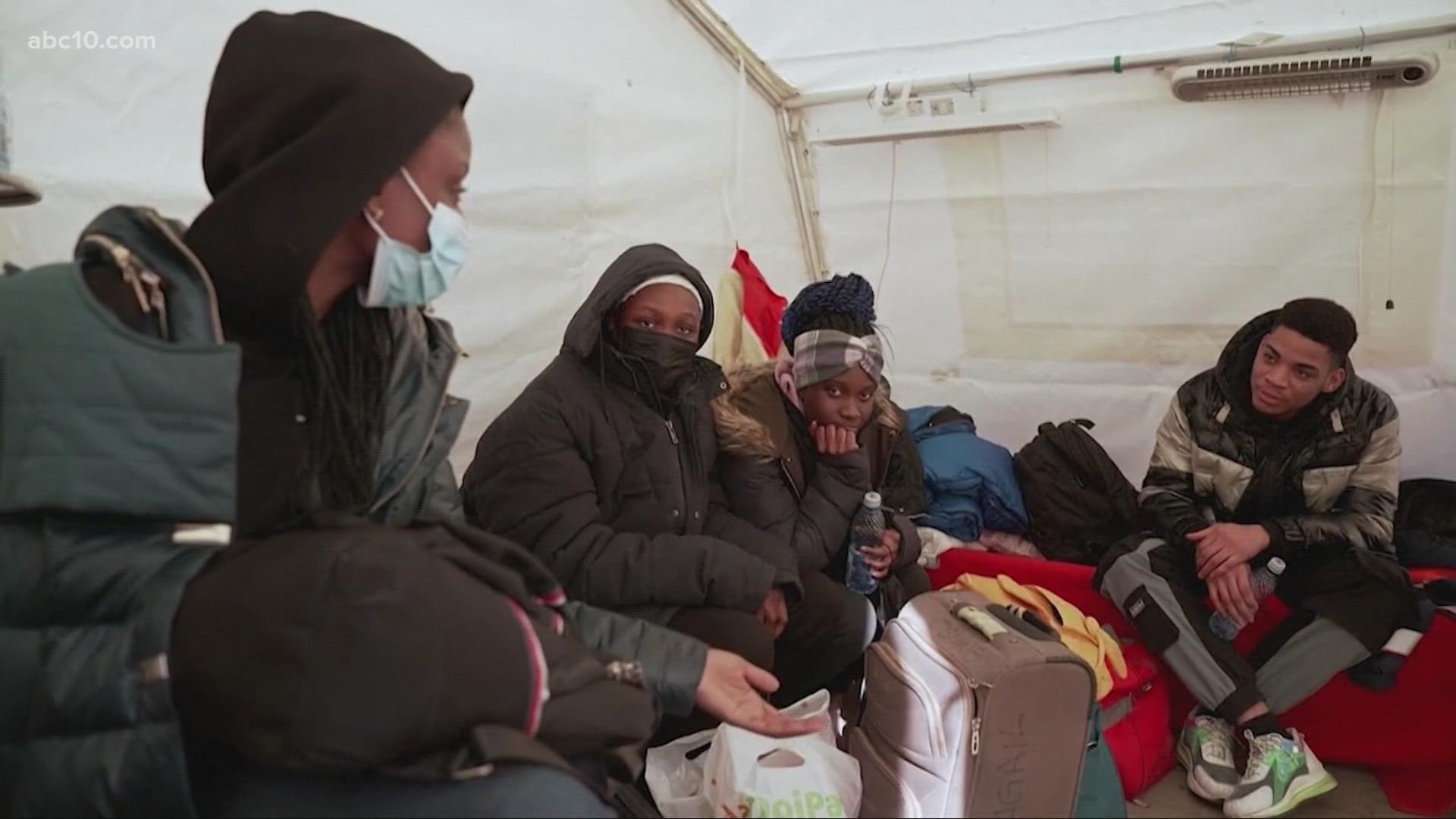SACRAMENTO, Calif. — According to the latest government data compiled by UNHCR, the UN Refugee Agency, more than one million Ukrainians have fled to neighboring countries to escape the Russian invasion. That number could soar to more than four million in the coming months.
"I have worked in refugee emergencies for almost 40 years, and rarely have I seen an exodus as rapid as this one," said Filippo Grandi, UN High Commissioner for Refugees. "Hour by hour, minute by minute, more people are fleeing the terrifying reality of violence. Countless have been displaced inside the country. And unless there is an immediate end to the conflict, millions more are likely to be forced to flee Ukraine."
Most people have left Ukraine for Poland, Hungary, Moldova, Romania, and Slovakia, while others have moved towards various other European countries. But, out of the mass of people leaving Ukraine, thousands come from other countries, too, like Africa, Asia, and the Mideast.
According to data from Ukraine's Ministry of Education and Science, in 2019 there were about 80,000 international students studying in Ukraine from 158 countries, the majority of which — about 23% — come from India, followed by Morocco, Azerbaijan, Turkmenistan and Nigeria.
As the Russian invasion of Ukraine continues, foreign students attempting to leave the country say they are experiencing racism and discrimination by Ukrainian border authorities. That includes people of African descent.
"As long as you are Black, no one likes you," said Ethel Ansaeh Otto, a student from Ghana attempting to flee Ukraine. "Mostly, they would consider white people first. White people first, Indian people, Arabic people, before Black people."
On Twitter, the hashtag "AfricansInUkraine" is being used to raise awareness worldwide about the mistreatment of Africans at the border. Some people, non-Ukrainians, have also complained about being forced to wait longer in line to cross the Polish border than Ukrainians — and in some cases felt treated poorly.
"I remember they punched a certain Black guy — a policeman in Ukraine, punches a certain Black guy for nothing," Otto said. "You are shocked, for nothing. Yes. So like I said earlier on, they consider white people before considering black people, yes."
Ukraine Minister of Foreign Affairs Dmytro Kuleba responded to the public reports of racism and discrimination in a tweet, stating, "Russia's invasion of Ukraine has affected Ukrainians and non-citizens in many devastating ways. Africans seeking evacuation are our friends and need to have equal opportunities to return to their home countries safely. Ukraine's government spares no effort to solve the problem."
During a press briefing at the Palais des Nations in Geneva on Tuesday, UNHCR spokesperson Shabia Mantoo stressed that there must be no discrimination against any person or group. The UN also urged governments to continue to maintain access to territory for all those fleeing Ukraine.
"UNHCR has a long-standing presence in the region, including in Poland, Hungary, Moldova, Slovakia and Romania, and is coordinating the refugee response with other UN agencies and NGO partners, in support of national authorities," Mantoo said. "We are reinforcing our operations by urgently sending more resources, staff, and relief items to deploy in the region while preparing to provide cash assistance via cards as needed. UNHCR child welfare and protection specialists are also ready to support national authorities."
In Sacramento, Dr. Ernest Uwazie works as the director of the Center for African Peace and Conflict Resolution (CAPCR). The center was established in 1996 at California State University, Sacramento, "to provide conflict resolution and reconciliation services for agencies, governments, institutions, businesses, civil society, and community organizations and other groups through training, education, research, and intervention."
"We are monitoring the situation," said Uwazie. "We condemn such acts of mistreatment of Africans or anybody, for that matter. We have received the reports, and some of us have also talked to some family members or friends in Ukraine to confirm the refusal or reluctance of Africans at the border."
Uwazie has a cousin who safely fled from Ukraine to Romania. After talking to his cousin on the phone earlier this month, Uwazie learned that he intentionally avoided the Polish border as a Nigerian amid reports of mistreatment of people of color.
"When I was talking with him, he wasn't dwelling so much on the cruelty of don't come because of your skin color," explained Uwazie. "He didn't want to dwell on it, which is understandable. But, he definitely didn't think it was acceptable. We continue to call on the government of Ukraine and the people of Ukraine to receive and treat Africans like any others."

